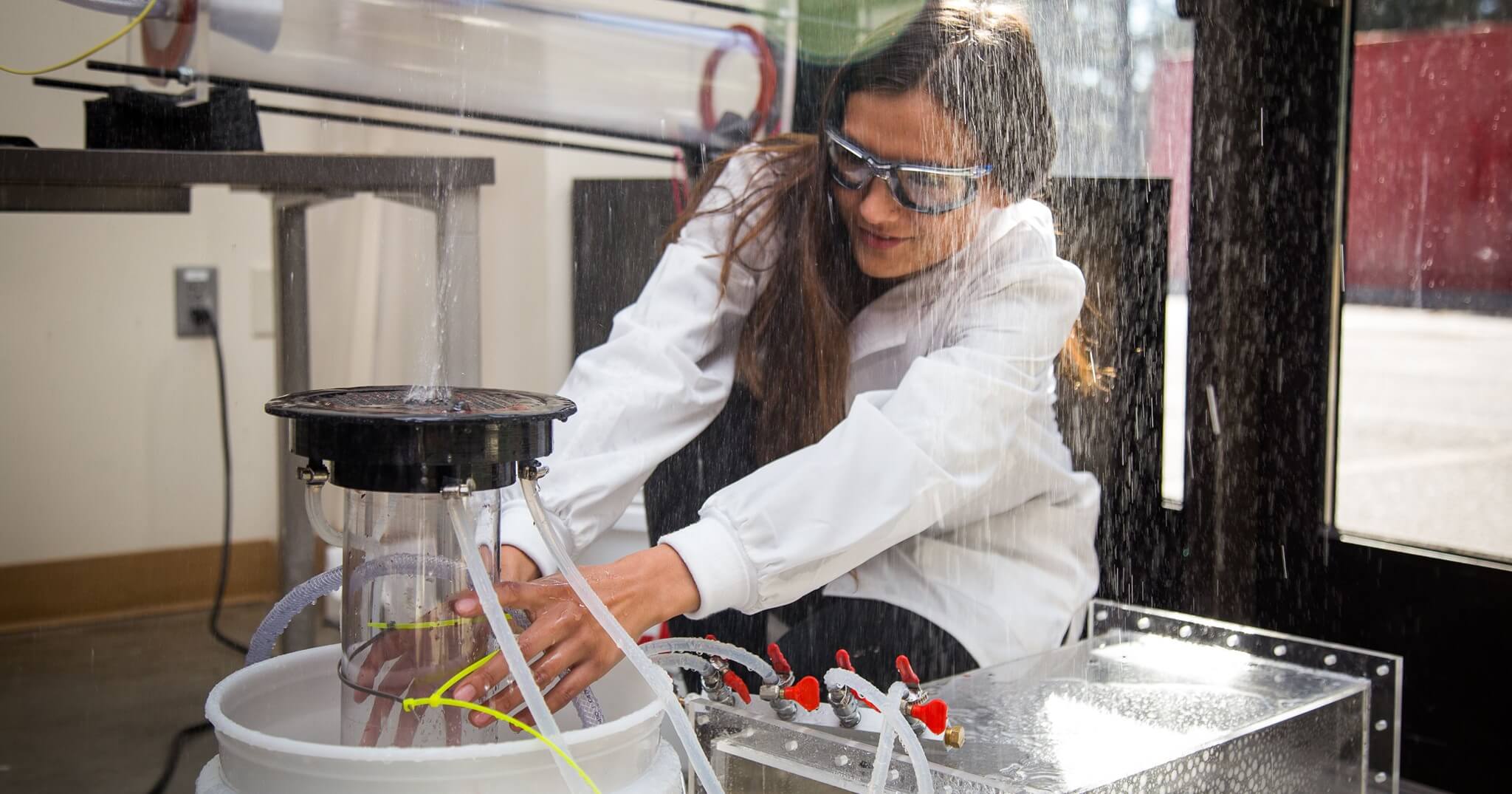
In a world where unprecedented events occur and technological advances abound — versatility is key. If you want to be an engineer, it’s a good idea to consider being a universal one. Chemical engineering is a top choice. It’s a field run by professionals that uniquely master a broad range of principles within the science and engineering field of study.
Their knowledge is in-demand, and their discoveries are profound. The proof is evident in the news and between the pages of history books.
In the first half of the 20th century, Pfizer chemical engineer John McKeen was instrumental in the industrial-scale production of penicillin via deep-tank fermentation. Sony engineer Yoshio Nishi led the development of the ubiquitous lithium ion battery –– launched in 1991 –– which powers practically all our on-the-go gadgetry today. In 2018, Frances Arnold, a professor of chemical engineering, won the Nobel Prize for her pioneering work in the use of directed evolution to design new enzymes.
Today, society is facing formidable challenges that include climate change, global population growth, and resource limitation. Chemical engineers are needed to combat these challenges and provide innovative solutions. For them, conserving energy is a priority, so is producing cost-efficient renewable energy technologies; enhancing productivity to make the technology more common; decarbonising the production process with CCS technology; and producing and designing nuclear reactors while ensuring standards of safety, efficiency and environmental protection are met.
The list goes on and if you’re looking to add to it, here are four universities with the resources to get you there:
Queen’s University, Department of Chemical Engineering
With beginnings that date back over 100 years, the Department of Chemical Engineering at Queen’s University is home to one of the oldest programmes of Chemical Engineering and the only Engineering Chemistry programme in North America. At this award-winning department, students can expect the highest standard of research and teaching.

At Queen’s, students make multidisciplinary connections through international collaborations, research exchanges, and entrepreneurial programmes. Source: Queen’s University
Here, students become world-changing experts in multiple ways. In the Chemical Engineering program they take part in a rigorous education that offers options in Chemical Process Engineering and in Biochemical Engineering, complemented by elective courses such as biochemical, biomedical, environmental, process systems engineering, energy, or materials. The Engineering Chemistry program is accredited by both the Canadian Society for Chemistry as a chemistry program and the Canadian Engineering Accreditation Board as an engineering program. This unique program combines fundamental chemical engineering training with knowledge of analytical, organic and electro chemistry, positioning its graduates at the interface of emerging chemical technologies and engineering design.
They are surrounded by the best undergraduate and graduate students from across Canada. They are taught by experts recognised at home and abroad. Labs are equipped with high quality, well-maintained equipment and a supportive team of technical staff overseeing exploration. For a well-rounded experience, students forge multidisciplinary connections through international collaborations and research exchanges. Programmes on entrepreneurship are also available covering the Fundamentals of Engineering Innovation and Entrepreneurship; Innovation and Entrepreneurship; or the Introduction to Entrepreneurship.
The location for these extraordinary offerings? The city of Kingston in eastern Ontario, where Lake Ontario flows into the St. Lawrence River, around 200 to 300 kilometres from Ottawa, Toronto, and Montréal. Described by students as both “quaint” and “eclectic,” Kingston is big enough to provide a vibrant student experience, yet small enough to ensure everyone feels at home. When aspiring chemical engineers aren’t celebrating their discoveries in the classroom, you could find them visiting landmarks like the Rideau Canal National Historic Site of Canada — a UNESCO world heritage site, the 1000 Islands Region, or the historic Kingston Public Market.
Johns Hopkins University, Department of Chemical and Biomolecular Engineering
Johns Hopkins University has a long history in chemical and biomolecular engineering with its history in the field dating back to 1913. Today, after much evolution, this dedicated, established department continues to challenge students with a rigorous curriculum that contains elements of biology, physics, chemistry, and advanced mathematical and computational methods.

The Department of Chemical and Biomolecular Engineering fosters an inclusive, diverse, and welcoming environment for faculty, staff, and students. Source: Johns Hopkins University
To do so, there are over 21 different laboratories here where various topics are studied such as electrochemistry, nanotechnology, tissue engineering, drug delivery, green energy, and many more. The department’s research is just as varied, targeted at solving many of the world’s most pressing concerns with the creation of earth-friendly biofuels and other sources of energy. The best part? Students do not just get to witness these milestones come to be, they also get to work alongside the industry’s best throughout the process.
Everyone is welcomed to get involved. The Department of Chemical and Biomolecular Engineering works tirelessly to foster an inclusive, diverse, and welcoming environment for faculty, staff, and students. Furthermore, it’s easy to feel at home in the city of Baltimore, Maryland — a vibrant hub of social, cultural, and economic activity that still manages to exude a small-town feel that has earned it the nickname Charm City.
University of Texas at Austin, Cockrell School of Engineering
This school has served as a global leader in engineering education and technological advancement for over a century. It’s no wonder many consider it a solid choice for comprehensive studies in chemical engineering. By combining areas of physics, chemistry, and mathematics, the Cockrell School’s chemical engineering students learn the technology of large-scale production and the manufacturing of products through chemical processes.

The Cockrell School of Engineering has served as a global leader in engineering education and technological advancements for over a century. Source: University of Texas at Austin
Here, students work with faculty members and researchers on various projects such as drug delivery systems, alternative fuel sources and process development. Their findings are impactful and the outcomes of their studies are rewarding. These graduates go on to work in the petrochemical, pharmaceutical, microelectronics, biomedical and environmental industries, in addition to pursuing careers in academia, national laboratories, medicine, business and law.
Beginning a rigorous chemical engineering programme can be daunting, but at the Cockrell School, every student is welcomed with open arms. Kicking off the year is the “Gone to Engineering” celebration held for new students. The event features speakers, a dinner and a student organisation fair for newcomers to learn about the 80 engineering groups they can join during their studies.
Oregon State University, School of Chemical, Biological and Environmental Engineering
Emphasis on the integration of chemical, biological, and environmental engineering principles. Practice in a student-centred learning environment. Work-ready graduates. Research expenditures that exceed US$8.9 million per year. There are several reasons why the School of Chemical, Biological and Environmental Engineering dominates as a top choice for aspiring chemical engineers.

At this school, every student takes on the challenge of making real contributions through research. Source: Oregon State University
Here, they focus on the basics. They work to understand the science and engineering of processes used to convert raw materials into high-value chemicals and products such as electronics, biofuels, synthetic fibers, polymer composites, advanced ceramics, medicines, and medical devices.
What’s more, every student takes on the challenge of making real contributions through research. Undergraduates work with faculty members, graduate students and their classmates to do so. They could also opt to pursue passions of their own. At Oregon State, many students have received grants for their research. Some have even had their findings published well before graduating.
*Some of the institutions featured in this article are commercial partners of Study International










